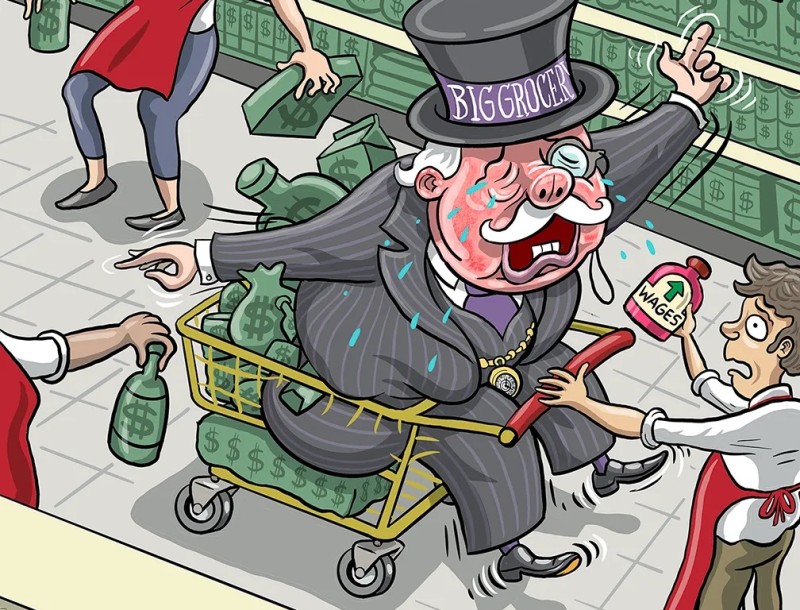Breaking the corporate stranglehold over Canadian consumer life
New book, The Big Fix, explores Canada’s monopoly problem and points the way forward for competition and antitrust law

“Cry Baby in the Shopping Cart.” Illustration by Graeme MacKay/Hamilton Spectator.
From gasoline to housing to groceries to concert tickets to fertilizer, the average Canadian can no longer afford a comfortable life, and everyone knows it. Although we disagree vehemently with one another on the root causes of the affordability crisis, if you’ve been reading the headlines and paying attention to how pricing has changed, then you know Canada has a much deeper problem than shifts in inflation or who sits in the Prime Minister’s Office: simply put, the country has become an oligarchy of corporate power fuelled by greed. Denise Hearn and Vass Bednar expose the details of the current crisis in a new book, The Big Fix: How Companies Capture Markets and Harm Canadians. They also propose solutions to bring the country back to a more inclusive form of capitalism that allows for better competition and fairer pricing.
The book’s first section expertly lays out many facets of Canadian consumer life that have undergone big changes over the past decade. Farming is a notable example. The writers observe that in the last 50 years, the number of farms in Canada has decreased by half, while the average size of the farm has doubled. Land value per acre has almost quadrupled. For the first time in our history, it is next to impossible to start a farm.
Four companies control most of the agricultural market along with pricing of all products and services used in the industry. Nutrien, based in Saskatoon, is the world’s largest provider of crop services and dominates fertilizer and potash exports. Canada is the world’s largest potash exporter and holds the greatest reserves of the mineral worldwide. Nutrien is the product of the 2018 merger of PotashCorp and Agrium, and in effect controls market pricing for basic farming services such as fertilizer.
Once publicly owned by the province of Saskatchewan, PotashCorp had its roots in the Saskatchewan Wheat Pool. The company has morphed into a subsection of Nutrien, the majority of whose shareholders are institutional: the Royal Bank of Canada and Vanguard are the top holders of shares. The merger has severely limited the ability of small farmers to grow food in Canada—a purpose precisely opposite to that of the iconic Wheat Pool. Because a handful of companies control food production in Canada, the price at the grocery store is controlled as well. When combined with the fact that most supermarkets are owned by one of five major grocery chains (Walmart, Costco, Loblaws, Sobeys, and Metro), the consumer has little to no chance of buying groceries at a reasonable cost.
This form of pricing control occurs in Canadian cultural institutions as well. Ticketmaster and Cineplex, each the result of earlier mergers and acquisitions, have triggered abnormal pricing increases not only by controlling ticket prices for all concerts and movies but also by allowing third parties to purchase and resell tickets to consumers at jaw-dropping prices. For Taylor Swift’s Eras Tour, which recently came through Toronto and Vancouver, a single ticket could run as high as USD $22,700. Little media attention was devoted, however, to the legal frameworks that permit prices to be inflated to this extreme degree.
The legal context for such price explosions rests with our country’s weak antitrust laws. Antitrust law, the authors explain, “seeks to define and promote good forms of competition” and is our only means of legal intervention against a firm’s effort to dominate an entire market to such an extent that it controls it. Such legislation could function as a fundamental interventionist tool for slowing down the harmful impacts of mergers and acquisitions on consumers, workers, and small businesses. Unfortunately, in the area of antitrust law, according to the authors, Canada falls short.
The first antitrust laws in Canada were developed in response to problems that emerged during the Industrial Revolution. Many laws were introduced during that period, including workers’ rights, child labour laws, factory acts, and railroad legislation. The same era also saw the creation of municipal police and waterworks. Antitrust laws were also promulgated during this period in efforts to stimulate small business development and protect consumers. In 1889, the Anti-Combines Act was passed to prevent national companies from becoming the primary driving force behind economic expansion. This legislation was followed by the Combines Investigation Act of 1910, which “broadened the definition of illegal combines to include monopolies and mergers that could harm public interest.” The problem with both pieces of legislation was that there was little to no oversight or enforcement; investigation only occurred after a complaint was made.
In the 1980s, at the height of the neoliberal Reagan-Thatcher era, competition policy in Canada was rewritten in an effort to liberalize markets. This process was carried out in such a wholesale manner as to make it seem as though the biggest corporate players had written the legislation themselves. But even as the largest firms gained market freedom, the situations of workers, consumers, and independent businesses were greatly diminished. Today, however, this neoliberal fantasy is dying. Hearn and Bednar suggest that a more democratic liberalism and a fairer structuring of markets are necessary in order to create more widespread prosperity and opportunity for all. The authors advocate for better competition law and stronger oversight of large companies and market shares. They warn that the “everything companies”—Amazon, Walmart, Costco—are now just “too big to care.”
Hearn and Bednar also point out that competition regulators need to focus on more than just price fixing. The consumer must also be protected from “unfair contract terms, deceptive design on online platforms, mass surveillance and unfair data usage [and] major asymmetries in bargaining.” They also note that power imbalances between workers or smaller suppliers and mega-corporations need to be redressed.
Along with many other aspects of such a government interventionist model, another point worth noting is the need for dedicated reporting on corporate power and consumer deception. We see such reporting in certain programs like CBC’s Marketplace, but a much more robust and wide-reaching approach is necessary to pull back the veil on the spoliative activities of corporate lobbyists and big investors, who have been able to expand their wealth and power to such a point that they no longer care in the slightest about accountability, let alone the interests of consumers or workers.
The Big Fix is written clearly and concisely, and ought to be accessible to a broader public. This is important since the success of capitalism, the quickness with which it adapts and evolves, relies so greatly on its mystification before the public. The writers should be applauded for creating a well-researched explanation of contemporary corporate Canada and its stranglehold over the public in such a readable and unpretentious text. In a relatively short read (140 pages), this little book packs a load of valuable information about shrinkflation, killer acquisitions, kayfabe (the illusion of rivalry), and Big Tech dominance of open-source AI. It is a succinct and effective breakdown of how consumer life has been shaped and controlled and, in particular, how Canada’s leaders have aided and abetted the machinations of corporations and the private sector writ large.
Still, Hearn and Bednar’s prescriptions are focused on creating a better capitalism, not dismantling the building blocks of capitalism itself, so those who seek a contemporary anti-capitalist critique may be disappointed. If we hope, however, to resolve issues such as climate catastrophe and severe labour exploitation, we will need a great deal more than stronger antitrust laws. Nonetheless, this reviewer agrees wholeheartedly with the authors that significant government intervention is required, and urgently.
Kimberly Wilson is a member of Canadian Dimension’s coordinating committee. Kim currently works as a community literacy worker in Toronto’s West End. She is a freelance editor and writer and holds a Master of Arts in Canadian Studies and Indigenous Studies from Trent University.










